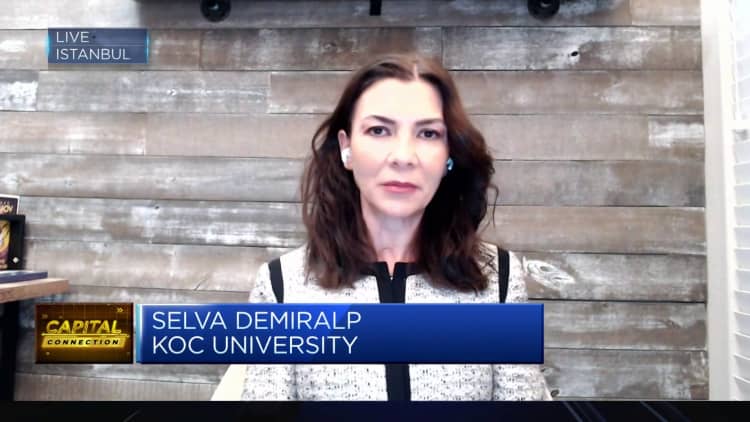Newly appointed Governor of the Central Bank of Turkey, Fatih Karahan in Ankara, Turkey on February 04, 2024.
Amin Sensar | Anatolia | Getty Images
Turkey's newly appointed Central Bank Governor, Fatih Karahan, has a difficult task ahead of him, having been appointed to the position by a presidential decree issued at the weekend following the surprise resignation of his predecessor, Hafiz Gay Erkan.
Previously, Karahan was deputy governor of the central bank, and the biography highlights his years at prominent US institutions and companies. He earned master's and doctoral degrees in economics from the University of Pennsylvania, spent nearly a decade as an economist at the Federal Reserve Bank of New York, and served as a part-time lecturer at Columbia University and New York University. Senior Economist at Amazon.
It is hoped that the 42-year-old economist's experience will serve him well when he heads the institution working to tackle the massive inflation and cost of living crisis that has hit Turkey's population of 85 million. The country's currency, the lira, has fallen by 38% against the dollar since the beginning of the year, and has lost more than 80% of its value against the dollar over the past five years.
Turkey's CPI reading was released on Monday which showed a nearly 65% year-on-year increase for January. Its central bank has made eight successive interest rate increases since May 2023 – bringing a total of 3,650 basis points – in an attempt to rein in rising inflation. The last interest rate increase, on January 25, raised Turkey's key interest rate by 250 basis points to 45%, although its leaders indicated at the time that the rate hike cycle was at an end.
Although it is painful for the country, investors and economists say the rate hike was necessary and that continuity on monetary policy priorities will generate confidence in the new central bank head.
In his statement published on the Turkish Central Bank's website on Sunday, Karahan emphasized “price stability” as his team's main priority, and pledged to “ensure inflation is reduced” and “maintain the necessary monetary tightening until inflation falls to levels consistent with our target.”

“All eyes are now on the new central bank governor, Fatih Karahan,” Liam Beach, chief emerging markets economist at London-based Capital Economics, wrote in a note on Monday. “In the current situation, monetary policy continuity looks set to continue.”
Wolfango Piccoli, co-president of Teneo Consulting, agrees with this view.
“Like Erkan, Karahan is not a critical economist, but he is nonetheless seen as a credible option,” Piccoli wrote in an analysis of the company.
“Unlike the recent changes of state governors, Erkan’s departure will not lead to a radical shift in policy stance,” he said, adding that the central bank could still “adopt a more hawkish tone regarding future guidance to support Karahan in his new role.”
Unconventional policy
Piccoli noted that Turkey's monetary policy remains ultimately at the mercy of Turkish President Recep Tayyip Erdogan, who has spooked investors for years by stifling the independence of the central bank and preventing it from raising interest rates despite runaway inflation that at one point exceeded 85%.
The more conventional political approach that began under Erkan and Turkey's Finance Minister Mehmet Simsek, who was also appointed last year, follows several years of unconventional policy. Erdogan had previously criticized interest rates, calling them the “mother of all evil” even as consumer prices rose and the lira fell.
Turkish Central Bank Governor Hafiz Gay Erkan answers questions during a press conference for the Inflation Report 2023-III in Ankara, Turkey on July 27, 2023.
Anatolia Agency | Anatolia Agency | Getty Images
“Regardless of Karahan’s status and the support provided by Treasury and Finance Minister Mehmet Simsek, Erdogan remains the final decision-maker,” Piccoli said.
“As long as the President remains supportive of the (gradual) conversion to the doctrine he endorsed after the 2023 elections, the identity of the governor is almost irrelevant because the TCMB has little (if any) institutional independence.”
Piccoli added that Karahan “will continue to have to work within the confines of a central bank that is not independent and does not include a sufficient number of professionals.” CNBC has reached out to the Turkish Central Bank for comment.
Investor confidence in Turkey has improved during the roughly eight-month tenure of Erkan, who became the first woman ever to serve as Turkey's central bank governor in June 2023. She tendered her resignation on Friday in a surprise announcement, saying the decision was due to the “assassination of her reputation.” “The campaign and the need to protect her family.
Erkan, like Karahan, also has a resume that includes America's institutional elite; She has a Ph.D. She earned a bachelor's degree in financial engineering from Princeton University and degrees from Harvard and Stanford Business Schools, and later worked at Goldman Sachs and First Republic, the latter of which she served as co-CEO. She was also a member of the board of directors of Tiffany & Co., and was named a director of Marsh McLennan, a professional services firm and Fortune 500 company.
